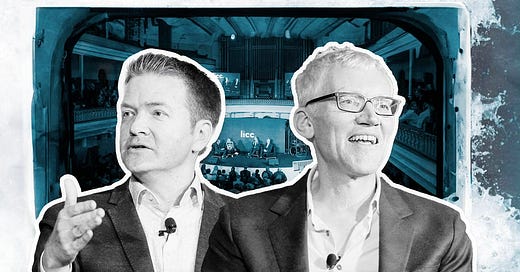Justin Brierley — he of "The Surprising Rebirth of Belief in God" podcasts — recently held a public discussion with Tom Holland, author of many best-selling history books (but most famously of Dominion), about the shifting place of Christian faith in our public life. One outburst from Holland struck me forcefully:
"The area of growth [of Christianity] seems to be churches that take the supernatural seriously. So it could be evangelical ones, but it could also be Anglo-Catholic ones. It's churches that take all the stuff about angels, and signs from God and miracles and everything seriously. Because I don't understand why anyone would be interested in a Christianity that isn't taking this stuff seriously. And I think the huge problem that a lot of institutional Christianity has in this country — whether it's Church of England, Catholic Church, whatever — is that there is a desire, whether conscious or not, on the part of many of the people responsible for it [i.e., leaders, senior clergy] to accommodate themselves to what they feel is the ideological mainstream."
Well, quite!
Because they have been shaped by that 'mainstream' (in schools, media etc.), there is a tendency to feel that its ideological presuppositions must be right.
Which would be a disaster if, in fact, those presuppositions were wrong.
Which they are.
At some level, there is a sort of guilt felt by many at dissenting so far as to be a Christian in the first place.
Among leaders — and preachers! it's you I'm coming after here — there is a kind of inner capitulation to the false nostrums of the surrounding society before you have even articulated what remains of your Christianity.
It is a capitulation that predestines you to lose every argument. Or, if you are too terrified even to argue, then to modify the drastic assertions that constitute the core of what Christianity actually is — and to compromise them so radically that what is left is adjudged by the public (and finally by believers themselves) as hardly worth the having. With results that we see all around us in declining numbers.
And to all of this, you see only two alternatives:
(I am speaking to you here as though you were the guilty party — which, of course, only some of you are.)
The first is the kind of violent repudiation of common sense espoused by those we might call tub-thumpers. The nut-jobbery that we observe, cringingly, perhaps especially in the U.S. — but from which other countries are hardly immune. The world is, apparently, controlled by a godless 'them' (generally identical with the political faction said tub-thumpers dislike). And ... heck, you know the rest of the story.
And the existence of the whackos re-confirms your willingness to stay onside with what Tom Holland calls "the ideological mainstream" of your own age and country.
The second alternative is gentler.
Without pushing the ideological boat out too far, you encourage what you fondly imagine to be 'cultural relevance'.
You fill your sermons with sporting and film references (your congregation having been raised to think that the world of public entertainment is somehow 'the real world' — by which they judge their own lives as schoolteachers or insurance clerks as somehow woefully deficient; a tragic mis-step which your preaching now reinforces);
you make your Scripture expositions full of woeful anachronisms (speaking, e.g., of Joseph in Genesis "getting a promotion at work"); and
you turn worship into a weekly, deafening rock concert.
But the long-term result is a 'faith' that is vapid; that feels like it was just invented a few weeks ago. And which does nothing to steel your congregants' ability to resist the overwhelming secularist flood they encounter daily in work; in the streets; in the all-consuming media; and, for the unlucky ones, at home.
In the end, they will tail away, too.
As we are finding.
What is needed is expositors of the faith who:
a) as Tom Holland notes, "take the supernatural seriously" — but without surrendering to every exhibitionist who is convinced they must share their latest cheese dream with the congregation;
b) quietly, calmly, and rationally rejects "the ideological mainstream" — not in favour of conspiracist or contrarian nut-jobbery, but because of an education in the wisdom of the ages, before the West's self-derailing in what we laughingly call 'the Enlightenment'.
It is that last which will require considerable intellectual and social courage.
To expound a full-orbed expression of "the faith once delivered to the saints" in a manner that is rational, but not rationalist. That looks at the controlling assumptions of secularist society and calmly challenges them, point for point — and provides a better, more compelling, and more loving alternative.
As I used to tell my students all the time, "If you wish to reject your opponent's conclusions, then I strongly advise you to reject his/her premises as well. Or I predict that you will lose the argument."







How about a series on a possible third option Meic?
I'm convinced that the paucity of belief in anything supernatural springs from the assumption that talk about Jesus is the same as the (often) hard work of trying to follow him. I think true supernatural activity happens on those few occasions when my spiritual faculties come alive enough to hear, and then be/do.
Loving your vlogs...